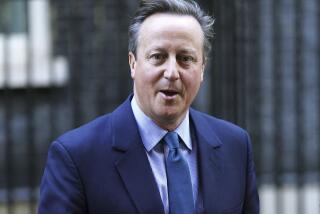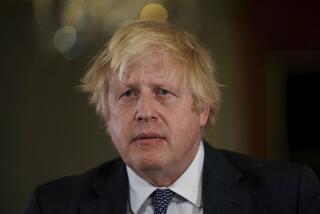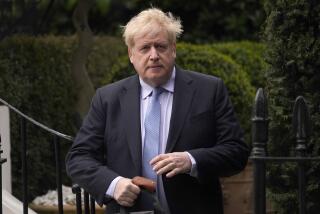Boris Johnson, Britain’s new foreign secretary, has a history of insulting people in other countries
In normal times, presiding over Britain’s storied Foreign and Commonwealth Office is a job weighted with historic gravitas, a coveted post held by a seasoned diplomat who employs tact and discretion to advance the nation’s complex interests spanning the globe.
But these are far from normal times in Britain, and the shambling figure of Boris Johnson known for outlandish serial insults aimed at a variety of targets — now calls those stately Italianate corridors his political home, a state of affairs that triggered a tsunami of derision from inside and outside the country.
Political observers worldwide groped for explanations Thursday as to why new Prime Minister Theresa May, whose reputation revolves around steadiness and caution, chose the remarkably undiplomatic Johnson as the symbol and personification of British diplomacy.
This is, after all, a man who attributed President Obama’s purported “ancestral dislike of the British Empire” to his half-Kenyan parentage, who likened Hillary Clinton’s appearance to that of “a sadistic nurse in a mental hospital,” who bowled over a Japanese child in a televised rugby scrum, and who penned a limerick suggesting the Turkish president had engaged in sexual congress with a goat.
Johnson has also suggested that the 28-nation European Union has aspirations similar to those of Napoleon and Hitler — sentiments that inspired outrage at the group’s headquarters in Brussels.
But in Britain, buffeted by fallout from last month’s vote to leave the EU, some saw May’s move as a canny means of appeasing an electoral majority that had voted 52% to 48% in favor of “Brexit” — while at the same time holding the “Leave” camp accountable for the referendum result. May says she will implement the break from the EU despite being on the “Remain” side during the campaign.
“It’s a kind of insurance policy if it all goes horribly wrong, and is horribly complicated,” said BBC political correspondent Rob Watson.
Johnson, with his trademark blond mop and well-documented penchant for buffoonery, was the most visible symbol of the campaign to leave the bloc. He was even touted as a prospective prime minister, and when his side won, it was a development that apparently caught him and his allies flat-footed, with little notion of how to keep promises made in the course of the campaign.
Johnson is expected to have far less of a hands-on role than other ministers during Brexit negotiations and in coping with the far-reaching economic repercussions of the prospective split.
May picked as her finance minister the departing foreign secretary, Philip Hammond. In that post, formally known as Chancellor of the Exchequer, Hammond is expected to work hard to calm world markets roiled by the referendum.
Veteran Conservative lawmaker David Davis was named to the newly created post of secretary of state for exiting the EU, and will be tasked with leading overall Brexit negotiations. Liam Fox — tarred by a 2011 scandal that forced him to resign as defense secretary —- was to head up a new international trade department also expected to be deeply involved with delicate talks with European trading partners.
Suggesting the Britain may be in no hurry, Hammond this week told lawmakers that implementing the decision to leave could take up to six years. May has not given any timetable for invoking Article 50 of the Treaty of Lisbon, which would trigger a formal start to two years of negotiations on Britain’s EU departure.
May on Thursday told Jean-Claude Juncker, the president of the EU Commission, that Britain would need time to prepare for talks over the prospective divorce, her spokeswoman said.
The Johnson appointment — provoking a mix of laughter and fascinated horror — was a break, if temporary, in the nonstop and obsessive speculation over how the split from the EU would play out.
Some officials managed to strike a diplomatic tone even as they struggled to contain their bemusement. An instant online classic was State Department spokesman Mark Toner’s reaction Wednesday, in which he digested news of the appointment while simultaneously uttering a carefully worded response about the special relationship between the United States and the United Kingdom transcending personalities.
Less measured was the French foreign minister, Jean-Marc Avrault, who on Thursday gave a blistering interview to French radio in which he described Johnson as a liar “who now has his back against the wall.”
Johnson and other leading Brexit advocates have walked back a number of high-profile claims made in the course of the campaign, such as the amount of money that could be diverted from the EU to Britain’s beleaguered National Health Service.
Some observers said the job could play to Johnson’s strengths as a charismatic cheerleader for Britain — and that by corralling him in a position of responsibility, May could avoid the headache of having him on the outside looking in.
Some European leaders took a welcoming tack, like Austria’s foreign minister Sebastian Kurz, who tweeted that he looked forward to working with Johnson.
But derision poured in from other quarters. The German business daily Handelsblatt dismissed Johnson as a “jester.” Belgium’s former prime minister, Guy Verhofstadt, tweeted that British humor “has no borders.”
At home, lawmaker Angela Eagle, who has launched a bid to lead the opposition Labor party, was captured on video sighing, shaking her head in incredulity and turning her back on an audience when she heard the news.
Supporters of May’s decision insist that the 52-year-old Johnson’s cartoonish public persona belies a sharp intellect and a cosmopolitan outlook. Oxford-educated and multilingual, he wrote a well-received book about Winston Churchill, whom he describes as one of his heroes.
Johnson’s appointment was not the only one to cause a stir. May summarily sacked Cameron loyalists like George Osborne, the finance minister. The lineup she finalized on Thursday included a number of women in leadership posts, including the naming of Amber Rudd to May’s former position as home secretary and Liz Truss as justice minister, replacing Michael Gove, the onetime Johnson ally who did not support him for leadership of the governing Conservative party.
May’s former rival for the leadership, Andrea Leadsom, was promoted to a full ministerial position from her former junior post in the previous Cabinet.
Johnson, meanwhile, appeared on his best behavior when he reported for duty Thursday at the Foreign Office, telling reporters that he had received a warm message from the French counterpart who had criticized him, and had a cordial exchange with Secretary of State John F. Kerry.
“Clearly we have to give effect to the will of the people in the referendum, but that does not mean in any sense leaving Europe,” he declared outside his new workplace. “There’s a massive difference between leaving the EU and our relations with Europe, which if anything are going to be intensified.”
UPDATES:
2:16 p.m.: This article has been updated throughout.
10:39 a.m.: This article has been updated with additional background information and reaction.
This article was originally published at 9:37 a.m.
More to Read
Sign up for Essential California
The most important California stories and recommendations in your inbox every morning.
You may occasionally receive promotional content from the Los Angeles Times.










